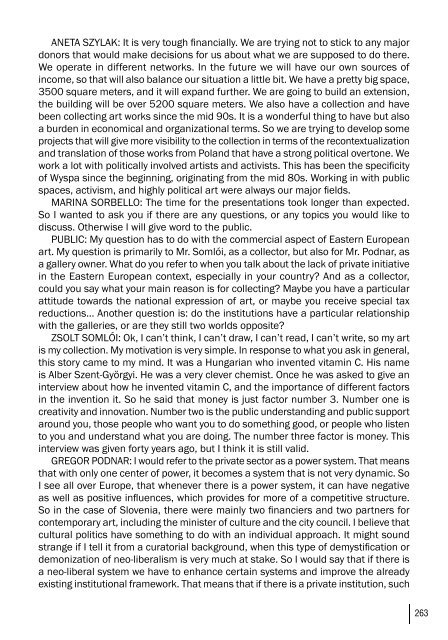art-e-conomy _ reader - marko stamenkovic
art-e-conomy _ reader - marko stamenkovic
art-e-conomy _ reader - marko stamenkovic
You also want an ePaper? Increase the reach of your titles
YUMPU automatically turns print PDFs into web optimized ePapers that Google loves.
ANETA SZYLAK: It is very tough financially. We are trying not to stick to any major<br />
donors that would make decisions for us about what we are supposed to do there.<br />
We operate in different networks. In the future we will have our own sources of<br />
income, so that will also balance our situation a little bit. We have a pretty big space,<br />
3500 square meters, and it will expand further. We are going to build an extension,<br />
the building will be over 5200 square meters. We also have a collection and have<br />
been collecting <strong>art</strong> works since the mid 90s. It is a wonderful thing to have but also<br />
a burden in economical and organizational terms. So we are trying to develop some<br />
projects that will give more visibility to the collection in terms of the recontextualization<br />
and translation of those works from Poland that have a strong political overtone. We<br />
work a lot with politically involved <strong>art</strong>ists and activists. This has been the specificity<br />
of Wyspa since the beginning, originating from the mid 80s. Working in with public<br />
spaces, activism, and highly political <strong>art</strong> were always our major fields.<br />
MARINA SORBELLO: The time for the presentations took longer than expected.<br />
So I wanted to ask you if there are any questions, or any topics you would like to<br />
discuss. Otherwise I will give word to the public.<br />
PUBLIC: My question has to do with the commercial aspect of Eastern European<br />
<strong>art</strong>. My question is primarily to Mr. Somlói, as a collector, but also for Mr. Podnar, as<br />
a gallery owner. What do you refer to when you talk about the lack of private initiative<br />
in the Eastern European context, especially in your country? And as a collector,<br />
could you say what your main reason is for collecting? Maybe you have a p<strong>art</strong>icular<br />
attitude towards the national expression of <strong>art</strong>, or maybe you receive special tax<br />
reductions... Another question is: do the institutions have a p<strong>art</strong>icular relationship<br />
with the galleries, or are they still two worlds opposite?<br />
ZSOLT SOMLÓI: Ok, I can’t think, I can’t draw, I can’t read, I can’t write, so my <strong>art</strong><br />
is my collection. My motivation is very simple. In response to what you ask in general,<br />
this story came to my mind. It was a Hungarian who invented vitamin C. His name<br />
is Alber Szent-Györgyi. He was a very clever chemist. Once he was asked to give an<br />
interview about how he invented vitamin C, and the importance of different factors<br />
in the invention it. So he said that money is just factor number 3. Number one is<br />
creativity and innovation. Number two is the public understanding and public support<br />
around you, those people who want you to do something good, or people who listen<br />
to you and understand what you are doing. The number three factor is money. This<br />
interview was given forty years ago, but I think it is still valid.<br />
GREGOR PODNAR: I would refer to the private sector as a power system. That means<br />
that with only one center of power, it becomes a system that is not very dynamic. So<br />
I see all over Europe, that whenever there is a power system, it can have negative<br />
as well as positive influences, which provides for more of a competitive structure.<br />
So in the case of Slovenia, there were mainly two financiers and two p<strong>art</strong>ners for<br />
contemporary <strong>art</strong>, including the minister of culture and the city council. I believe that<br />
cultural politics have something to do with an individual approach. It might sound<br />
strange if I tell it from a curatorial background, when this type of demystification or<br />
demonization of neo-liberalism is very much at stake. So I would say that if there is<br />
a neo-liberal system we have to enhance certain systems and improve the already<br />
existing institutional framework. That means that if there is a private institution, such<br />
263


